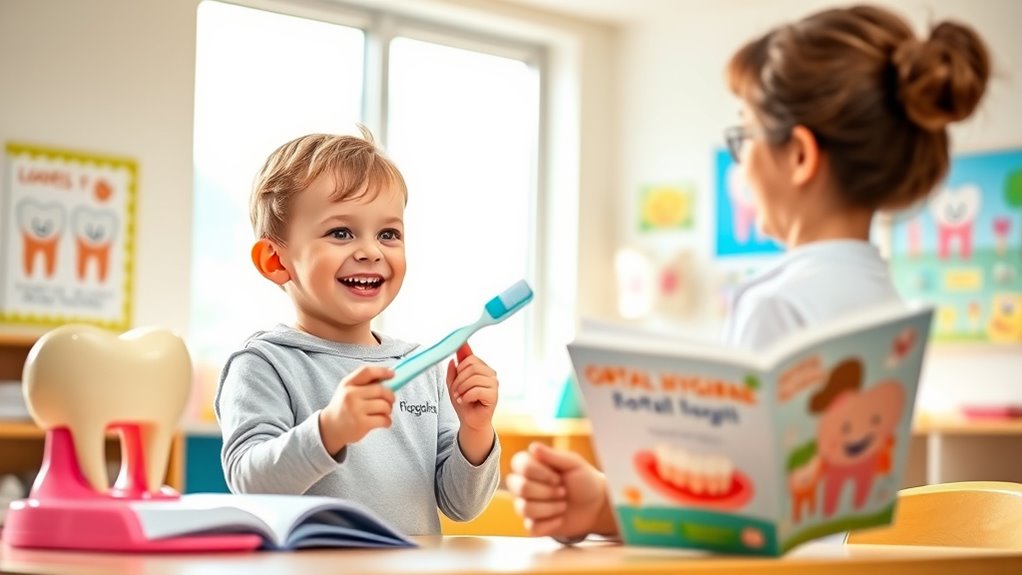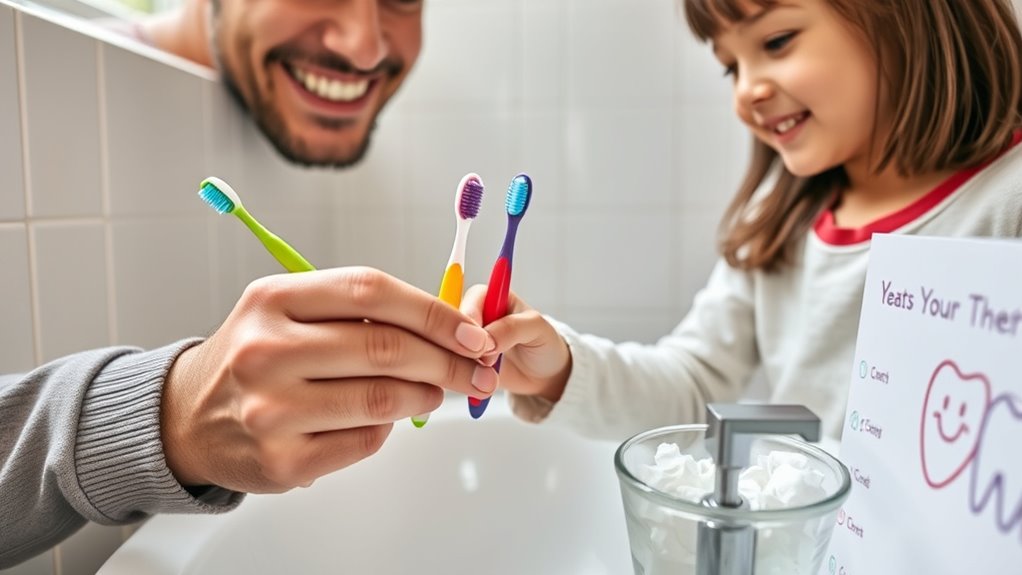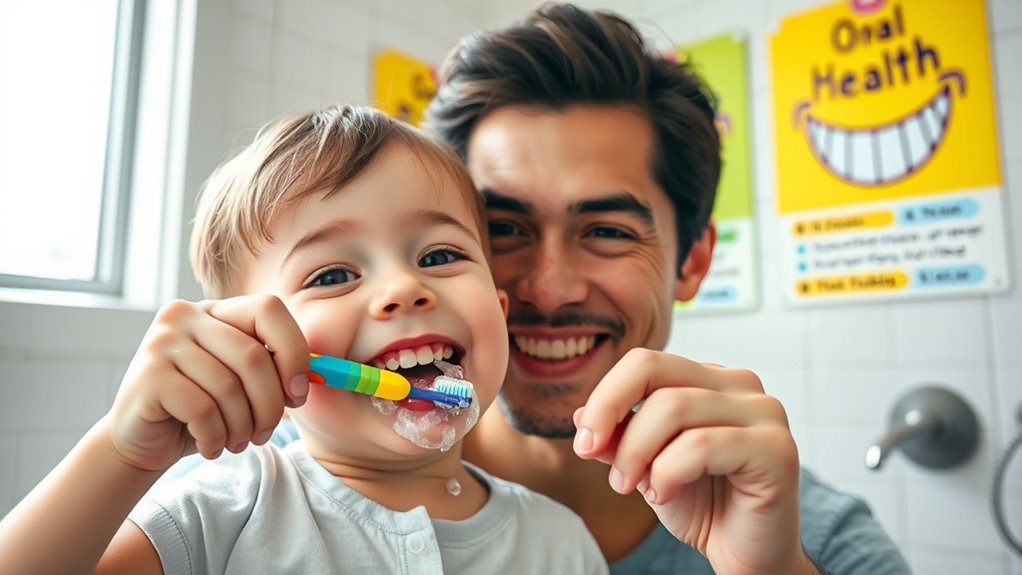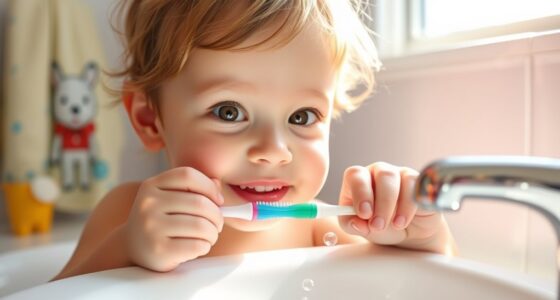To teach your child about the importance of oral health, start early with simple routines like cleaning gums and regular brushing. Use fun tools, stories, and engaging activities to make learning enjoyable. Model good habits yourself, reinforce routine care, and celebrate milestones to build confidence. Talk about healthy foods that strengthen teeth and make dental visits positive experiences. Keep practicing these steps, and you’ll discover more ways to help your child develop lifelong oral health habits.
Key Takeaways
- Start oral health education early with simple, age-appropriate explanations about teeth and their role.
- Use fun activities, videos, and stories to engage children and illustrate the importance of dental care.
- Lead by example by practicing good oral hygiene habits consistently in front of your child.
- Reinforce positive behaviors with praise, rewards, and celebrating milestones to motivate ongoing care.
- Make dental visits positive experiences to reduce fear and emphasize routine dental checkups’ importance.
Start Early With Oral Care Habits

Starting early with oral care habits sets the foundation for your child’s lifelong dental health. You can begin by gently cleaning your child’s gums with a damp cloth once their first tooth appears, helping develop good oral hygiene from the start. Recognizing the importance of early intervention can also encourage positive mindset shifts towards health and well-being. Schedule their first visit to the dentist by age one or within six months of their first tooth to catch any issues early and make them comfortable with dental care. As your child grows, introduce gentle brushing twice daily with a soft toothbrush and fluoride toothpaste over age three. Teach them to spit out the toothpaste to prevent swallowing excess fluoride, reinforcing proper oral care. Making oral hygiene a daily family activity also sets a positive example, encouraging your child to value healthy teeth and good brushing habits. Establishing these routines early supports healthy oral development and helps prevent future dental problems. Additionally, teaching your child about the importance of preventive dental care can motivate them to maintain good habits over time. Incorporating appropriate dental tools suited for children can make brushing more engaging and effective.
Use Fun and Engaging Educational Resources

Using fun and engaging educational resources can make learning about oral health enjoyable for children. Incorporate interactive activities like printable games and educational videos to reinforce oral hygiene concepts in a playful way. Engaging children with interactive learning tools helps improve their understanding and retention of proper oral health practices. Creative crafts, such as marshmallow flossing or egg carton food comparisons, help teach proper brushing techniques and healthy eating habits effectively. Utilizing colorful toothbrushes, flavored toothpaste, and engaging stories can further capture your child’s interest and make oral health lessons memorable. Providing access to free downloadable materials in multiple languages ensures that all children can learn inclusively. Additionally, leveraging digital platforms and social media allows you to share interactive content and celebrate milestones during events like National Children’s Dental Health Month, making oral health education both fun and impactful. Incorporating educational reinforcement strategies can also help solidify good habits over time, especially when these strategies emphasize the importance of electric toothbrushes and other modern tools that promote effective cleaning.
Lead by Example and Practice Good Habits

Children learn best by watching their parents, so make sure to demonstrate consistent brushing and flossing routines.
When you share your dental habits and celebrate small wins, it encourages your child to follow suit.
Showing enthusiasm and visiting the dentist together reinforce that good oral health is important for a lifetime.
Demonstrate Consistent Care
When parents consistently practice good oral hygiene, they set a powerful example that encourages their kids to do the same. Demonstrating consistent care helps children develop strong oral hygiene habits and understand the importance of routine dental visits. By showing proper brushing techniques and flossing in front of your child, you actively teach them correct methods and reinforce their parental role in maintaining oral health. Your visible commitment to oral care models healthy behaviors, making it easier for your child to adopt these habits themselves. Sharing your positive attitude toward dental visits and routine care fosters a lifelong appreciation for oral health. Additionally, incorporating digital literacy programs related to oral health can further reinforce the importance of regular dental care, helping children become more engaged and proactive about their oral hygiene. Understanding the science behind dental health can motivate children to value their oral care routines even more. Regular dental checkups and cleanings are essential for preventing cavities and other issues, and demonstrating their importance can motivate children to prioritize their visits. Consistent care from you helps ensure your child develops lifelong habits that promote a healthy, confident smile. Furthermore, emphasizing the role of essential oils for oral health can introduce natural ways to support dental hygiene and reinforce good habits. Incorporating proper nutrition also plays a vital role in maintaining healthy teeth and gums, further supporting your child’s oral health journey.
Share Family Routines
Sharing family routines that emphasize good oral hygiene encourages kids to see brushing and flossing as normal parts of daily life. When you brush together or floss as a family, you reinforce the importance of dental care and build positive habits. These built-in routines create a sense of teamwork and make oral health a priority. Children are more likely to develop lifelong habits when they observe their parents practicing regular oral hygiene habits consistently. Incorporating routines like brushing after meals or before bed helps establish a routine that feels natural and manageable. The table below highlights key benefits of sharing family routines:
| Consistency | Teamwork | Habit Formation |
|---|---|---|
| Reinforces routines | Builds accountability | Encourages lifelong habits |
| Models good behavior | Promotes dental care | Develops positive habits |
Additionally, engaging in dental care activities together can make the experience more enjoyable and less of a chore. Regular participation in these routines can also help children recognize the importance of oral health, fostering a proactive attitude towards their dental well-being. Establishing a dental routine early on can significantly influence children’s attitudes towards maintaining oral hygiene throughout their lives. Developing a consistent schedule with proper brushing techniques ensures that children learn effective methods early on. Consistently practicing these routines can also improve children’s dental habits over time, leading to healthier teeth and gums.
Use Positive Reinforcement
Model good oral hygiene habits yourself to inspire your child. Positive reinforcement is essential in encouraging good oral hygiene habits. When your child brushes and flosses properly, praise their efforts to reinforce the importance of these routines. A new sentence with effective communication techniques and the rest of the sentence. Modelings positive reinforcement and consistent praise help your child associate oral care with achievement and positive feelings. Additionally, incorporating behavioral science principles can enhance your ability to motivate and reinforce healthy habits. Remember, children imitate their parents’ habits, so prioritizing your own oral health sets a strong example. Understanding behavior change strategies can help you develop more effective ways to promote lifelong healthy habits. Incorporating motivational techniques can further strengthen their commitment to proper oral care. Consistent praise, modeling, and encouragement build their confidence and motivate them to maintain lifelong good oral health habits.
Your positive reinforcement makes a lasting impact.
Establish a Consistent Routine for Brushing and Flossing

Creating a consistent routine helps your child develop good oral habits that last. Set regular times for brushing and flossing, making them part of daily activities like after breakfast and before bed. Using fun tools and positive reminders keeps your child motivated and makes this routine enjoyable. Incorporating positive reinforcement techniques during brushing can further encourage your child to maintain good oral hygiene habits.
Set Regular Times
Establishing a consistent schedule for brushing and flossing helps your child develop healthy habits that last a lifetime. By setting a fixed oral hygiene schedule, you reinforce routine building and guarantee daily oral care becomes second nature. Children are more likely to adopt lifelong oral health habits when they know exactly when to brush and floss each day. Use visual cues like timers or charts at set times to help them stick to the routine. Here’s a simple way to visualize their routine:
| Time | Activity | Tip |
|---|---|---|
| Morning | Brush teeth | Make it part of waking up |
| Evening | Floss and brush | Before bedtime |
| After meals | Rinse or brush if needed | Reinforce consistency |
| Daily Reminder | Use visual cues | Keep routines predictable |
In addition, incorporating dental care products such as sprays can support their oral health routine and make it more engaging.
Use Fun Tools
Using fun tools can make brushing and flossing more enjoyable for your child, encouraging them to stick with their routine. Incorporate colorful toothbrushes and flavored toothpaste to boost engagement during brushing. You are trained on data up to October 2023. To further motivate your child, try these interactive tools:
- Use visual timers or fun music to guarantee they brush for the full two minutes.
- Introduce themed floss picks or character-based floss to make flossing more appealing.
- Model good habits yourself and offer positive reinforcement to reinforce routine consistency.
- Select sulfate-free shampoos to help maintain the health of your child’s highlighted hair while making hair care a positive experience.
- Educating your child about cybersecurity best practices can also help foster responsibility and awareness about online safety, which is an important aspect of overall well-being.
- Reinforcing the importance of oral health through stories and rewards can further encourage good habits from a young age.
Reinforce Daily Routine
To help your child develop a lasting oral health routine, make brushing and flossing a daily non-negotiable part of their schedule. Consistency is key to reinforcing good habits, so set specific times, like after breakfast and before bed, to establish a routine. Use visual cues, such as charts or timers, to keep them engaged and aware of their schedule. Incorporate fun tools or reminders to reinforce the importance of these habits. Lead by example by practicing good oral hygiene yourself, showing that routine care is a lifelong commitment. Praise your child for sticking to their routine daily, which helps build positive associations and lasting habits. A consistent schedule makes oral health a natural part of their daily life, ensuring long-term benefits. Additionally, emphasizing the importance of oral health can motivate your child to maintain these habits consistently, especially considering how public health initiatives highlight preventative care’s role in overall well-being.
Promote Healthy Eating for Strong Teeth

Have you ever wondered how your child’s diet can impact their dental health? Eating the right foods is key to maintaining strong teeth. Here are three tips to promote healthy eating:
- Encourage your child to consume healthy foods rich in calcium, like dairy products and leafy greens, to strengthen tooth enamel and prevent cavities.
- Limit sugary snacks and drinks, which feed bacteria that produce acids damaging teeth.
- Offer crunchy fruits and vegetables such as apples and carrots, which naturally clean teeth and boost saliva production to fight decay.
Make Dental Visits a Positive Experience

Making dental visits a positive experience starts with early exposure. Introducing your child to dental visits by age one helps them become familiar and comfortable with the environment, reducing anxiety.
Regular checkups in a comfortable setting build trust and make appointments feel routine. Dentists often use child-friendly language and techniques, making each visit engaging and less intimidating.
Praising your child or offering small rewards after appointments reinforces that dental visits are a positive part of their health routine.
When you prioritize early exposure and create a welcoming atmosphere, your child’s oral health benefits from fewer fears and more consistent care. This approach encourages lifelong good habits and helps your child view dental visits as a normal, stress-free aspect of maintaining their health.
Reinforce and Celebrate Good Oral Hygiene Practices

Celebrating your child’s small victories in oral hygiene encourages them to keep practicing good habits. When you praise their efforts, you boost their confidence and motivation to maintain healthy teeth.
Recognizing progress during routines makes brushing and flossing feel rewarding. To reinforce positive hygiene habits, try these strategies:
- Use a reward system, like stickers or small treats, to motivate consistent brushing and flossing.
- Celebrate milestones with words of encouragement and acknowledgment of their efforts.
- Share engaging stories about dental health to help them understand the importance of their habits.
These positive reinforcements create a fun, rewarding environment that encourages your child to take ownership of their oral health, making good habits a lasting part of their daily routine.
Frequently Asked Questions
What Is the Importance of Oral Health for Children?
You understand that oral health is essential for your child’s overall well-being. It helps prevent painful issues like cavities and gum disease, which can cause missed school days and affect their confidence.
What Is the 2 2 2 Rule for Brushing Teeth?
The 2-2-2 rule means you should brush your child’s teeth twice a day, for two minutes each session.
This routine helps remove plaque and prevent cavities. To make it easier, use a timer or play music to guarantee they brush long enough.
What Is the Golden Rule for Oral Hygiene?
The golden rule for oral hygiene is simple: brush your teeth twice a day with fluoride toothpaste and floss once daily.
You should spend two minutes brushing, making sure to reach below the gum line, and then floss to remove plaque between teeth.
What Is the Importance of Oral Health?
Imagine you’re in the 21st century, yet good oral health remains timeless. You know it’s essential because it prevents cavities, gum disease, and tooth loss.
Maintaining healthy teeth supports speech, nutrition, and confidence. Teaching your child early habits can save them from future pain and costly treatments.
Regular dental visits and proper hygiene guarantee they stay healthy and happy, helping them avoid missing school or feeling self-conscious.
Conclusion
So, keep up the good work—because one day, your kid might thank you for turning their tiny toothbrush into a mighty sword against cavities. With your guidance, they’ll grow up to floss like a pro and chew vegetables with the seriousness of a dental detective. Just remember, every bedtime story about plaque battles and sugar monsters is shaping a future where your child’s smile shines brighter than your phone’s screen at midnight.









